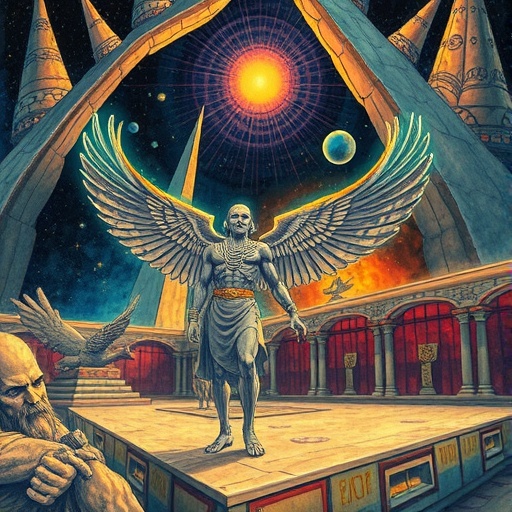
A groundbreaking new article published in the peer-reviewed journal Psychedelic Medicine challenges a widely accepted but contentious narrative within psychedelic culture—the notion that the ancient Greek Eleusinian Mysteries were fueled by psychedelic substances. This idea, popularized by influential books such as “The Road to Eleusis” (1978) and Michael Pollan’s “The Immortality Key” (2020), as well as mainstream media platforms including podcasts like Joe Rogan’s, has long permeated both academic and popular discussions about the origins of Western spirituality. The article, authored by Dr. Sharday Mosurinjohn and Dr. Richard Ascough, professors of religious studies at Queen’s University, rigorously critiques the foundations of what they term the “psychedelic mysteries hypothesis.”
The Eleusinian Mysteries, sacred rites practiced for nearly two millennia in ancient Greece, have captivated scholars and psychedelic advocates alike due to their purported use of a secretive, mind-altering potion called kykeon. The hypothesis that this potion contained psychoactive components like ergot alkaloids or other hallucinogenic compounds has been influential but remains speculative. Mosurinjohn and Ascough argue that such claims lack solid empirical backing and urge a more sober historical methodology that acknowledges the limitations of circumstantial evidence. Their analysis cautions that leaning on shaky historical narratives to validate contemporary psychedelic research and legal frameworks may ultimately jeopardize the credibility of the psychedelic medicine field.
Importantly, the commentary does not dismiss the transformative potential of psychedelics outright nor does it reject the importance of ancient spirituality in the development of human consciousness. Instead, it calls for “responsible curiosity,” encouraging scientists and clinicians to critically evaluate the historical narratives that underpin psychedelic therapies today. The authors warn against the conflation of cultural myths with clinical evidence, noting that framing psychedelics as inherently safer or more therapeutic because of a presumed ancient pedigree is misleading and scientifically unsound. This call for intellectual rigor is particularly timely given the rapid expansion of psychedelic-assisted treatments for mental health conditions like depression, anxiety, and PTSD.
.adsslot_ZoKy1763He{width:728px !important;height:90px !important;}
@media(max-width:1199px){ .adsslot_ZoKy1763He{width:468px !important;height:60px !important;}
}
@media(max-width:767px){ .adsslot_ZoKy1763He{width:320px !important;height:50px !important;}
}
ADVERTISEMENT
Mosurinjohn explicitly states, “Psychedelics should not be framed as somehow more credible, or more safe, or more therapeutic on the basis of a flawed idea that they were used by ancient Pagans at Eleusis, and inherited by early Christians after them.” This critique disrupts the romanticized notion that modern psychedelic medicine can claim lineage from a “hidden tradition” of psychoactive religious rites. Indeed, the article underscores that while entheogenic drug use is well-documented in numerous religious traditions worldwide, the evidence for psychedelics’ role in Eleusis remains tenuous at best. Such a manufactured historical “legitimacy” risks overshadowing living indigenous and esoteric traditions that have preserved psychedelic knowledge with greater authenticity.
The motivation behind the perpetuation of the Eleusinian psychedelics myth may be partly strategic: proponents utilize this narrative as part of broader sociopolitical efforts to establish legal, cultural, and religious legitimacy for psychedelic substances. However, Mosurinjohn and Ascough caution that these efforts, when grounded in historically questionable claims, may ultimately undermine the psychedelic revival movement’s scientific integrity and public trust. They suggest that the modern psychedelic renaissance should pivot away from attempting to authenticate itself through ancient examples and instead cultivate its legitimacy on transparent clinical research and open societal dialogues.
Moreover, the article invites the psychedelic community to broaden its perspective beyond neurotransmitter interactions and pharmacodynamics, embracing a fuller understanding of spiritual transformation that encompasses both drug and non-drug modalities. Meditation, ritual, psychotherapy, and other experiential practices are integral components of a holistic framework for psychedelic-assisted healing. The authors advocate a nuanced approach that recognizes the right to mental liberty and transformation as a complex interplay of historical, psychological, and cultural factors, rather than a simplistic inheritance from an imagined mystical past.
From a scientific standpoint, this commentary underscores the importance of robust historical scholarship as an adjunct to neuropharmacological and clinical research. Psychedelic medicine, with its interdisciplinary nature, demands critical engagement across the humanities and sciences to avoid perpetuating myths that may obscure or distort empirical findings. The article’s call for greater historical humility resonates with the broader scientific community’s emphasis on reproducibility, transparency, and evidence-based practice.
The discussion also serves as a reminder of the potent role social narratives play in shaping public perceptions and policy decisions surrounding psychedelics. As psychedelic drugs transition from fringe substances to mainstream therapeutic agents, the stories told about their origins and cultural significance matter profoundly. Ensuring these stories are rooted in credible scholarship is essential to fostering public understanding and responsible regulation.
In conclusion, while the allure of a psychedelic origin story for Western spirituality endures, Mosurinjohn and Ascough’s article provides a vital corrective by highlighting the speculative nature of such claims regarding Eleusis. They encourage stakeholders in the field—from researchers to policymakers—to prioritize current empirical research and respect the diverse tapestry of living psychedelic traditions worldwide. This approach promises to cultivate a more scientifically sound and culturally sensitive future for psychedelic medicine, focusing on real-world benefits rather than mythic validations.
Subject of Research: Not applicable
Article Title: Psychedelics, Eleusis, and the Invention of Religious Experience
News Publication Date: 25-Jul-2025
Web References:
Article DOI: 10.1177/28314425251361835
Psychedelic Medicine Journal: https://home.liebertpub.com/publications/psychedelic-medicine/673/overview
Image Credits: Mary Ann Liebert, Inc.
Keywords: Psychoactive drugs, Psychopharmacology, Science and religion, Religion, Science history, Health and medicine, Drug delivery, Drug therapy, Drug studies, Cultural practices, Meditation, Environmental health, Population biology, Demography, Research methods
Tags: ancient Greek Eleusinian Mysteriescritique of psychedelic mysteries hypothesisDr. Richard Ascough contributionsDr. Sharday Mosurinjohn researchempirical evidence in psychedelic researchhistorical methodology in religious studiesimpact of influential psychedelic literatureinfluence of mainstream media on psychedelicspsychedelic substances in ancient ritualsrole of kykeon in ancient Greecescholarly debate on spirituality originsskepticism in psychedelic culture





